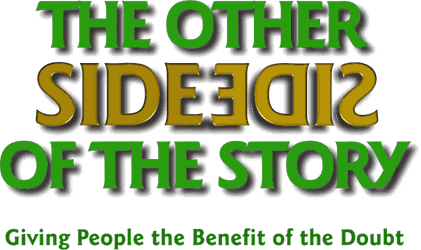The Other Side of the Story - Dressed to Kill
In a mystery, we're always looking for the culprit. Sometimes, we don't have far to go. Let's examine the case of the woman who was...
Dressed to Kill
I was at a wedding, standing with a group of friends. We were discussing clothing, shoes, bags and getting ready for a dressy occasions.
R. admitted, "It took me two hours to get ready for this wedding."
I piped up, "Two hours! I could never spend two hours to get ready."
"Well," commented R. "that's why I look like this and you look like that."
I turned and walked away, not knowing where to put myself or what to think. Why would she have said something like that? After replaying the conversation endless times in my mind, it suddenly dawned on me that R. must have felt insulted and lashed back at me for what she felt was an insensitive comment directed at her. Seeing her comment in the context of a response put it in an entirely different light.
A hurtful statement may have been a defensive response to what was perceived as a verbal push. In judging favorably it is helpful to recognize the part we play in triggering other people's responses. When people feel verbally attacked, they often strike back. We often don't see our comments as provocative until someone lets us know - in no uncertain terms - that they felt provoked. Others may perceive our words, tone of voice, or facial expressions as hostile or derisive, even though we didn't mean them as such.
The above is an example of finding a merit for a person which, although it does not completely clear the person, it does make the person look better. To completely exonerate the woman in the story, let's examine her words again, but this time let's interpret her words to mean the exact opposite: "That's why I look (bad) like this, and you look (good) like that (because you don't need to spend so much time getting ready, while I do)!
Does this seem like a far-fetched interpretation of her words? Rabbi Chaim Ozer Grodzinsky was once asked by his students: Everything Hashem created has a purpose. What is the purpose of creating "crooked" reasoning? His answer: "So we can use it to judge others favorably."
The Other Side of the Story Archives |
Do you have a story to share?
Were you in a situation where there was the potential to misjudge a person, but there really was a valid explanation? Has a friend or a relative ever told you how they were in such a situation?
Share you stories with us for inclusion in future columns of The Other Side of the Story.
To submit your story, send it to [email protected]. (To insure proper handling, put "Other Side" in the subject line of your message).
![]() Subscribe to The Other Side of the Story via PointCast
Subscribe to The Other Side of the Story via PointCast







